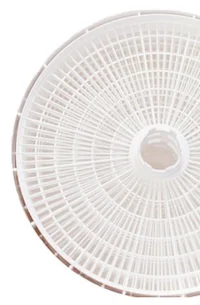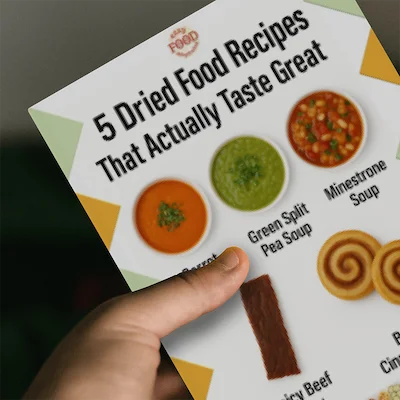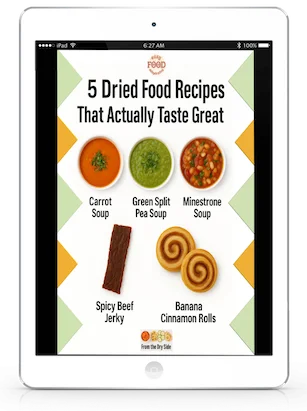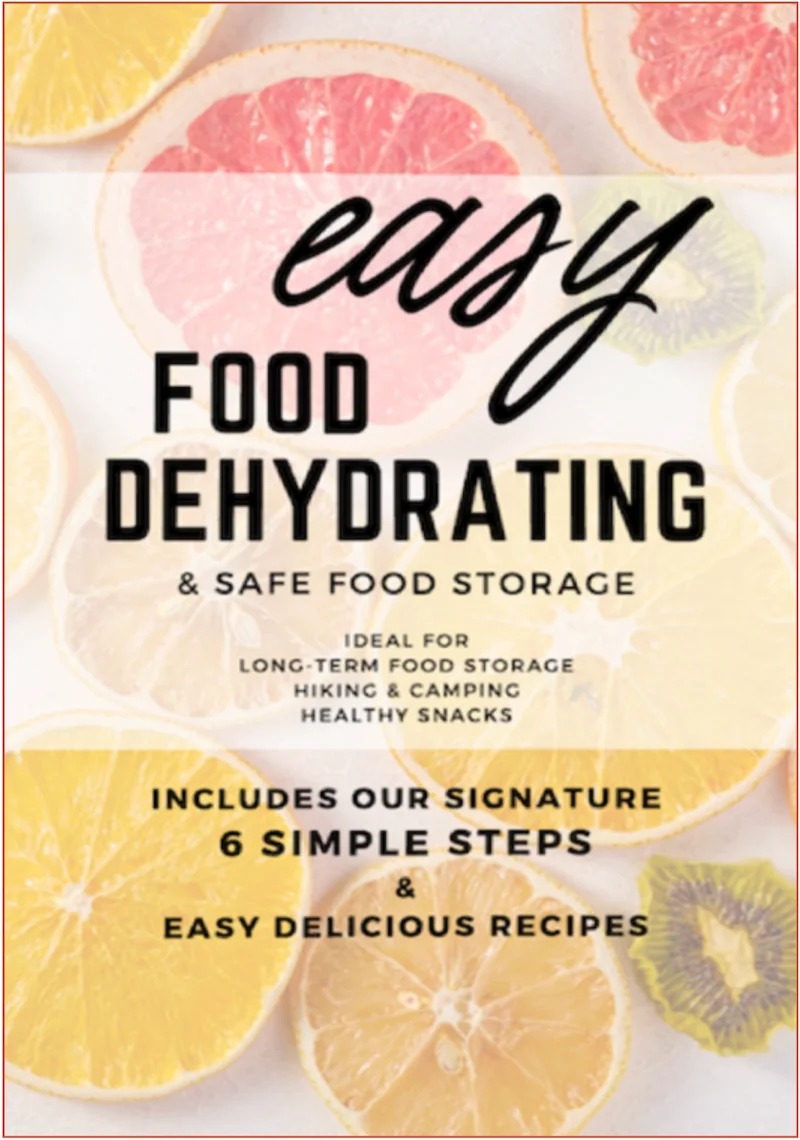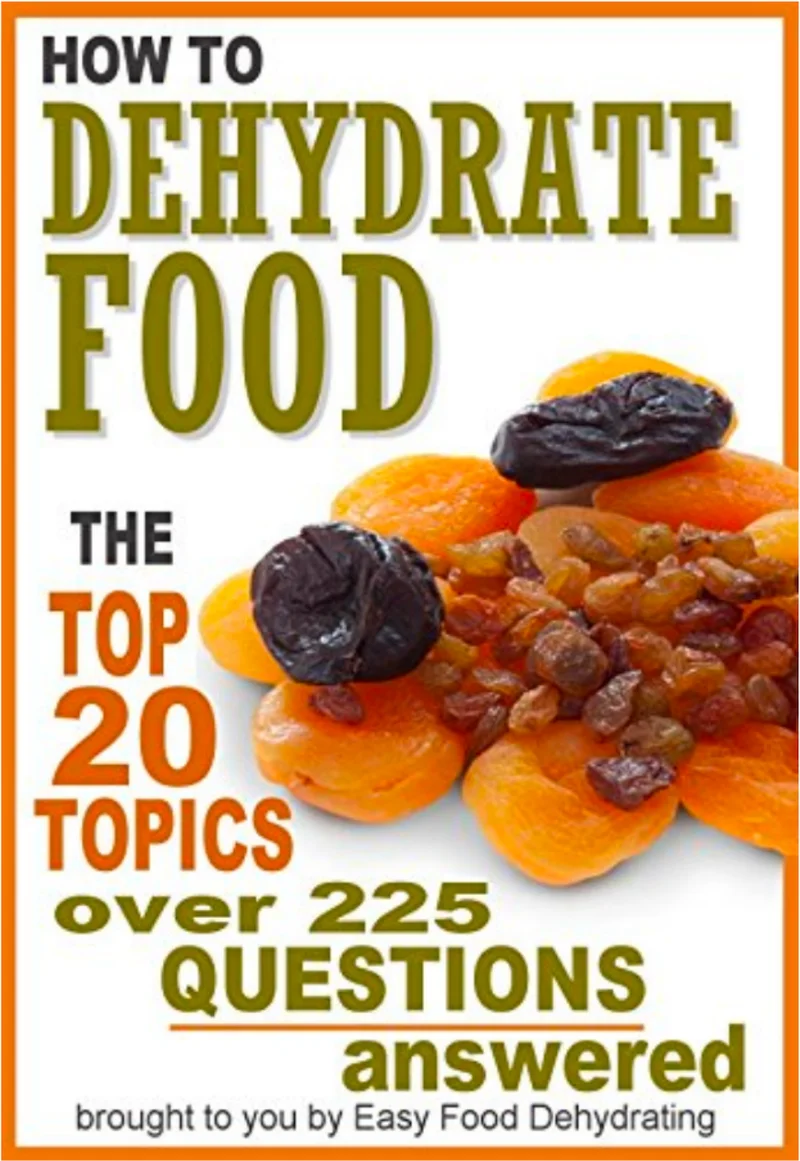What We Mean by “Dehydrate”
Here at Easy Food Dehydrating, “dehydrate” always means using an electric food dehydrator — the easy, reliable way to dry food at home.
- Home
- What Are Food Dehydrators
What Are Food Dehydrators and
How Do They Preserve Food Naturally?

Want to store food naturally—without relying on freezers or cans? A food dehydrator makes it easy. These compact appliances remove moisture from fruits, vegetables, herbs, and even meats, preserving them for months or years while keeping flavor and nutrition intact.
✅ Quick Answer: What are food dehydrators?
A food dehydrator is an electric appliance that removes moisture from food using gentle heat and airflow. By drying food thoroughly, it prevents spoilage, mold, and bacteria—making fruits, vegetables, meats, and herbs last longer without refrigeration or chemicals.
Whether you’re stocking up for emergencies, saving money, or reducing waste, dehydrators are a smart kitchen ally.
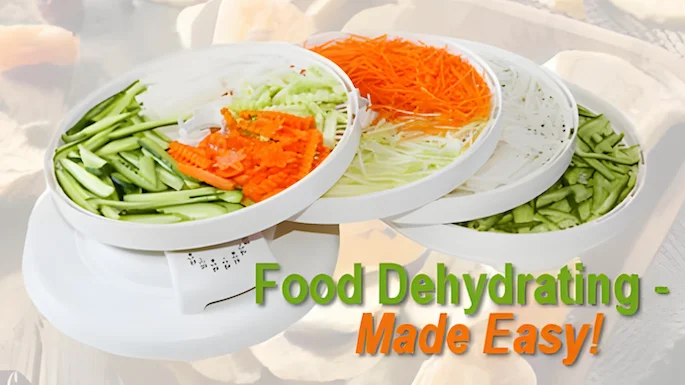
What Is a Food Dehydrator (and Why Use One)?
A food dehydrator is an electric kitchen appliance that removes moisture from food using low, steady heat and continuous air circulation. By drying food completely, it helps prevent spoilage, mold, and bacteria—without using chemicals or refrigeration.
Think of it as a gentle, low-temperature oven with a built-in fan, designed to preserve food safely for the long haul.
How Does a Food Dehydrator Work?
Food dehydrators work by simply removing the moisture in foods with an air-circulating fan via a built-in heating element.
They all include temperature controls that range (usually!) from 90°F to 160°F so you can choose the
appropriate setting. (For fruit, vegetables, meat, or seafood click those links for complete information for their temperature settings, thanks).
🔥 Heat Source
The heat source gently warms the food to the right temperature—usually between 95°F and 160°F, depending on what you're drying.
- Lower temps (95°F–115°F): Great for herbs and delicate fruits.
- Higher temps (135°F–160°F): Ideal for meats, dense veggies, and jerky.
💡 Tip: Outside the U.S.? Most dehydrating temps here are listed in Fahrenheit - use our quick converter to see the Celsius equivalent for your machine.
Dehydrators are not silent-running—but they do run in the background. In fact, they create a good white noise! Beats hearing the neighbor's barking dogs and street noise!
The dehydrators for home use are lightweight—so they're easy to get in and out of a cupboard! All the dehydrators I own are made from plastic. One is black (Excalibur) with molded panels that resemble leather-hide and has a rear fan.
The other model (Nesco) is a speckled white/gray sturdy plastic and its fan is mounted at the top in the lid.
AND the Elite Gourmet has clear trays so you can see the food. I LOVE that.
The Excalibur and Nesco dehydrators are four-tray starter models. I chose the smaller starter units because there's only the two of us at home (hubby and I).
If you've got a larger family, choose a dehydrator with far more trays.
I also have a post on the 5 best dehydrators for drying herbs you may find interesting.
Are Food Dehydrators Just a Trend—or Here to Stay?
Food Dehydrators have been around for a very long time so they're not a fad appliance.
When I first saw
them back in 2010, I did think they were a fad, and who on earth would want one of those? (Turns out, I did!)


What Foods Can You Dehydrate at Home? (More Than You Think!)
More than just banana chips—trust me!
✅ Fruits – Apples, bananas, pineapples, strawberries (see all fruit here).
✅ Vegetables – Tomatoes, carrots, zucchini, sweet potatoes (see all veg here).
✅ Meats – Beef jerky, turkey strips (fully cooked first - see meats here).
✅ Seafood – Salmon, tuna, shrimp (see seafood here).
✅ Herbs – Oregano, mint, basil, parsley - and more! (get free herbs eBook here).
✅ Snacks – Fruit leather, veggie crisps, granola, flax crackers
Why Choose a Food Dehydrator Over Freezing or Canning?
Foods can be preserved by canning, freeze-drying, smoking, or DEHYDRATING. See this page on 6 Different Ways to preserve food.
To me, the easiest method by far is dehydrating! The simplicity of it appealed to me more than anything.
- No Preservatives or Additives Needed
- Shrink Food Size for Easier Storage
- Save Money on Groceries & Reduce Waste
- Perfect for Emergency Prep & Camping
- Preserve Garden Harvests or Bulk Buys
🛑 Stop throwing out spoiled produce. Start saving it the smart way!
There are two sections below,
covering the Excalibur and Nesco
dehydrators in more detail.
Click the big
links to learn more
right here on this site
about the dehydrators we use:
There are two sections below, covering the Excalibur and Nesco dehydrators in more detail.
Click the big
links to learn more right here on this site about the dehydrators we use:
For More Info. on the Excalibur
Dehydrator on Our Site, Click Here
...see you over there!
For More Info. on the
Excalibur Dehydrator
on Our Site, Click Here
...see you over there!
Excalibur DEHYDRATORS Available on Amazon
💡 Tip: Outside the U.S.? Most dehydrating temps here are listed in Fahrenheit - use our quick converter to see the Celsius equivalent for your machine.
Excalibur 2400 Food Dehydrator, 4-Tray Starter
This is a square-shaped food dehydrator, that boasts 4 square feet of drying space. Black textured plastic body. Remove the front panel for access to its four trays.
- 220 watts of drying power
- 4 removable trays
- 16.25 x 13 x 6.5 inches (LxWxH)
- Temperature range: 95°F – 165°F
- Comes with: 4 trays, a digital download guide to dehydration
- Best for beginners with small kitchens
Excalibur 2900ECB 9-Tray Electric Food Dehydrator
This is a square-shaped food dehydrator, that boasts 15 square feet of drying space. Black textured plastic body. Remove the front panel for access to its nine trays.
- 400 watts of drying power
- 9 removable trays
- 19 x 17 x 12.5 inches (LxWxH)
- Temperature range: 105°F – 165°F
- Comes with: 9 trays, a digital download guide to dehydration
- Best for bulk drying & serious users
Excalibur 3900B 9-Tray Electric Food Dehydrator
This is a square-shaped food dehydrator, that boasts 15 square feet of drying space. Black textured plastic body. Remove the front panel for access to its 9 trays. Has a built-in on/off switch.
- 600 watts of drying power
- 9 removable trays
- 19 x 17 x 12.5 inches (LxWxH)
- Temperature range: 105°F – 165°F
- Comes with: 9 trays, a digital download guide to dehydration
As an Amazon Associate, I earn from qualifying purchases — this does not affect the price you pay. Read full disclosure.
For More Info. on the NESCO
Dehydrator on This Site, Click Here
...see you over there!
For More Info. on the
NESCO Dehydrator
on This Site, Click Here
...see you over there!
Nesco DEHYDRATORS Available on Amazon
💡 Tip: Outside the U.S.? Most dehydrating temps here are listed in Fahrenheit - use our quick converter to see the Celsius equivalent for your machine.
Nesco FD-80A Food + Jerky Dehydrator
This is a square-shaped food dehydrator, perfect for snacks, fruit, and beef jerky. White with a top black tray edge, with a white lid.
- 700 watts of drying power
- Expandable to 8 trays
- 15.25 x 10.25 x 15.63 inches (LxWxH)
- Temperature range: 95°F – 160°F
- Comes with: 1 Clean-A-Screen, 1 Recipe Instruction Book, 1 Jerky Seasoning & Cure Sample
Nesco FD-61WHC Snackmaster Encore Food Dehydrator
This round Nesco Snackmaster comes with a jerky gun kit and 5 trays. It has a very light grey body with a darker grey lid.
- 500 watts of drying power
- Expandable to 12 trays
- 13.5 x 13.5 x 9.25 inches (LxWxH)
- Temperature range: 95°F – 160°F
- Comes with: 1 Jerky Gun with 3 tip attachments, 2 Fruit Roll Sheets, 2 Clean-A-Screens, 5 Jerky Seasoning & Cure Samples, Recipe & Instruction book
- Best budget-friendly jerky dehydrator
Nesco FD-60 Snackmaster Express Food Dehydrator
This is the new version of mine as it has an updated lid. It's a light grey body with a darker grey lid.
- 500 watts of drying power
- Expandable to 12 trays
- 13.5 x 13.5 x 9.25 inches (LxWxH)
- Temperature range: 95°F – 155°F
- Comes with: 1 Fruit Roll Sheet, 2 Original-Flavor Jerky Spice & Cure Packets
As an Amazon Associate, I earn from qualifying purchases — this does not affect the price you pay. Read full disclosure.
Is Buying a Food Dehydrator Really Worth the Investment?
Absolutely—and not because I saw it on a kitchen gadget infomercial or some flashy online ad.
What really pushed me to get one was the very real possibility of a global food shortage within the next decade.
If you've read up on superpower China, you’ll know how much U.S. debt they own—and that China must maintain a double-digit growth rate to support a population four times larger than ours. The question is: how will the world produce enough food to feed China… and still feed the rest of us?
And just so you know—I wrote that long before COVID-19 disrupted the global food supply chain. Add in the war in Ukraine, one of the world’s major fertilizer exporters, and it’s clear we’ve entered a new era of instability.
Do You Really Need to Prepare Now (or Can It Wait)?
Not necessarily. That’s why I’m preparing right now.
We’ve already seen:
- Inflation (and possibly hyperinflation) driving food prices up
- Home quarantines disrupting our daily lives
- Empty grocery shelves becoming all too common
And don’t forget the possibility of a collapsing economy. Food security is no longer a fringe prepper idea—it’s a practical step anyone can take.
How Inflation Impacts Food Costs—and Why Dehydrators Help
Every time the government prints more money, it dilutes the value of the dollars already in circulation. That means:
- Your dollars buy less food than they did 6 months ago
- Prices creep up—or skyrocket—without warning
- Stocking up now makes more sense than waiting until it’s unaffordable
It’s unsettling, yes—but if the warnings turn out to be true, I’ll be glad I took action early.
So when I see fresh food on sale, I grab it, dehydrate it, and store it for later.
No waste. No panic. No dependence.
Why Dehydrating Today Brings Peace of Mind Tomorrow
And hey—what if I’m wrong?
Then I’ll have a pantry full of shelf-stable fruits, veggies, and meats… and maybe I’ll look a little over-prepared. But I’d rather look a bit silly than be hungry or helpless later on.
We’ve already lived through one global crisis. Many thought food shortages couldn't happen in the U.S. But they did. COVID-19 caught everyone off guard.
Preparing now isn't panic—it’s peace of mind. And a food dehydrator is one of the easiest, most affordable tools you can use to get started.
Thanks for stopping by "What are food dehydrators." You learned "the why" behind my food dehydrator purchases; that was over a decade ago and we've come full circle.
Food Dehydrator FAQs: Your Top Questions Answered
How long does dehydrated food last?
How long does dehydrated food last?
Stored in airtight containers with oxygen absorbers, most dehydrated foods last 6 months to 1 year. With Mylar bags and proper storage, shelf life can extend 10–25 years.
Does a food dehydrator cook food?
Does a food dehydrator cook food?
No. Dehydrators use low heat and airflow to dry food, not cook it. Nutrients remain largely intact, unlike high-heat cooking methods.
Is dehydrating cheaper than freezing or canning?
Is dehydrating cheaper than freezing or canning?
Yes. Dehydrators use little energy and don’t require jars, lids, or freezer space, making them cost-effective long-term.
What can I dehydrate besides fruit?
What can I dehydrate besides fruit?
You can dehydrate vegetables, herbs, meat for jerky, homemade snacks like granola, and even full meals such as soups for camping.
How do I choose the right food dehydrator?
How do I choose the right food dehydrator?
Look for adjustable temperature controls, enough trays for your family size, and reliable airflow. Popular brands like Nesco and Excalibur are trusted for durability.
Thanks for visiting and learning what food dehydrators are all about. Once I discovered how easy it is to preserve fruits, veggies, and even jerky, I never looked back.
If you’d like to try it for yourself, don’t leave without grabbing your free 5 Dried Food Recipes You'll Actually Love PDF. Inside, you’ll find my favorites like carrot soup, minestrone, split pea soup, spicy beef jerky, and even banana cinnamon rolls—perfect starter recipes to enjoy right away!
Get 5 Dried Food Recipes You'll Actually Love
Here's where you can get your copy of our all new
5 Dried Food Recipes (That Actually Taste Great)
They're my all-time favorite easy dried food meals!
Get it here right now.
For Free!
Before You Go...
If you enjoyed this page, tap the ❤️ in the lower right-hand corner.
It saves this page to your Grow bookmarks so you can find it again later.
You’ll also see quick share buttons to copy the link, post to Facebook,
or save it straight to Pinterest.
